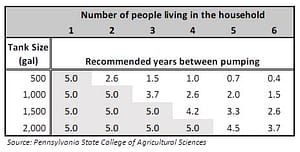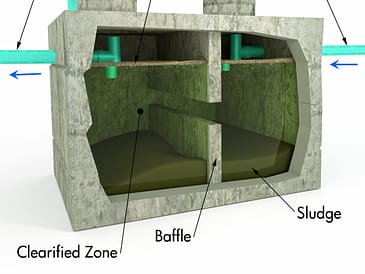The care and maintenance of your septic tank is crucial for the proper functioning of your septic system. Regular pumping is necessary to prevent issues such as sewage backups and groundwater contamination. The frequency of pumping depends on various factors, including the size of your tank and usage. It is recommended to consult with a professional to determine the appropriate pumping schedule for your septic tank. Don’t neglect the importance of septic tank pumping, as it can save you from costly repairs and ensure the longevity of your septic system.
Why is septic tank pumping important?
Septic tank pumping is important for several reasons:
Preventing sewage backups
Regular pumping helps prevent sewage backups in your home. When a septic tank becomes full, it can lead to the backup of sewage into your toilets, sinks, and drains. This can create a messy and unsanitary situation that requires immediate attention.
Ensuring proper functioning of the septic system
Regular pumping ensures that your septic system is working properly. When a septic tank is not pumped regularly, solid waste and sludge can build up, leading to clogs in pipes and potential damage to the septic system. By pumping the tank, you remove this buildup and allow the system to function as intended.
Preventing groundwater contamination
Proper and regular pumping of the septic tank helps prevent groundwater contamination. If a septic system is not properly maintained, it can leak wastewater into the surrounding soil and groundwater. This can be harmful to the environment and pose health risks. Pumping the tank removes the wastewater, reducing the risk of contamination.
How does a septic tank work?
To understand the importance of septic tank pumping, it’s essential to know how a septic tank works. A septic tank is a large underground system that collects and stores wastewater from your home.
Understanding the septic system process
When wastewater from your toilets, sinks, washing machine, and other sources flows into the septic tank, it separates into three layers. The solid waste and heavier substances sink to the bottom and form a layer of sludge. The lighter substances, such as fats and oils, float to the top and create a layer of scum. The middle layer is mainly composed of clarified liquid, known as effluent.
The role of bacteria in the septic tank
Inside the septic tank, bacteria work to break down the organic matter present in the solid waste, converting it into simpler substances. This process helps reduce the volume of solids and prevent the tank from becoming completely filled too quickly.
The importance of a well-designed drain field
The effluent, which is the partially treated wastewater, exits the septic tank and flows into a drain field or leach field. The drain field consists of a network of perforated pipes buried in gravel-filled trenches. The effluent is released into the drain field and slowly filtered through the soil, where natural processes further treat it before it reaches the groundwater.

How often should you pump your septic tank?
The frequency of septic tank pumping depends on several factors:
Frequency of pumping determined by tank size
The size of your septic tank plays a significant role in determining how often it needs to be pumped. Smaller tanks have less holding capacity and therefore require more frequent pumping compared to larger tanks.
Factors affecting pumping frequency
In addition to tank size, the number of people living in your home, water usage, and the presence of a garbage disposal also affect the frequency of septic tank pumping. A larger household with high water usage and regular use of a garbage disposal may need more frequent pumping than a smaller household with lower water usage.
Signs that your septic tank needs to be pumped
There are several signs that indicate your septic tank needs to be pumped:
- Slow draining sinks and toilets
- Unpleasant odors in and around your home
- Gurgling sounds in the plumbing system
- Sewage backups or pooling water in the yard
- Excessive plant growth around the drain field
Can you pump your septic tank yourself?
Pumping a septic tank is a complex process that requires specialized equipment and knowledge. While it is possible to pump your septic tank yourself, it is generally recommended to hire a professional for this task.
The process of pumping a septic tank
Pumping a septic tank involves locating the tank, uncovering the access point, and using a vacuum truck to remove the solid waste and scum from the tank. The pumping process also includes inspecting the tank and drain field to identify any potential issues.
When to hire a professional for septic tank pumping
While some homeowners may have the necessary equipment and experience to pump their septic tank, it is advisable to hire a professional septic service for this task. Professionals have the expertise, equipment, and knowledge to ensure that the pumping process is done correctly and without causing damage to the septic system.
Considerations for DIY septic tank pumping
If you are considering pumping your septic tank yourself, keep the following considerations in mind:
- Proper waste disposal: Properly disposing of the pumped waste is essential to prevent contamination and comply with local regulations.
- Health and safety: Pumping a septic tank can be physically demanding and potentially hazardous. It involves working in confined spaces and handling potentially harmful substances. Safety precautions and protective gear should be used.
- Ease of professional assistance: Hiring a professional septic service eliminates the need for you to undertake the pumping process yourself. Professionals can quickly and efficiently complete the job, saving you time and effort.
What happens if you don’t pump your septic tank?
Not pumping your septic tank regularly can lead to several consequences:
Buildup of solid waste and sludge
If a septic tank is not pumped regularly, solid waste and sludge can accumulate at the bottom. As the tank becomes filled, it has less storage capacity, leading to potential issues such as clogs in pipes and sewer backups.
Potential damage to the septic system
The accumulation of solid waste and sludge can also lead to damage to the septic system. The excess solids can clog pipes and cause blockages, leading to costly repairs and potential system failure.
Increased risk of sewage backups
When a septic tank is not pumped regularly, the risk of sewage backups into your home increases. This can lead to unpleasant odors, unsanitary conditions, and the need for emergency plumbing services.
Conclusion
The frequency of septic tank pumping plays a crucial role in the proper functioning of your septic system. By adhering to regular pumping schedules, you can prevent sewage backups, groundwater contamination, and potential damage to your septic system. Consult with a professional septic service to determine the appropriate pumping frequency based on your tank size, usage, and other factors. Investing in septic tank pumping can save you from costly repairs and ensure the longevity of your septic system.





